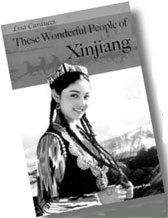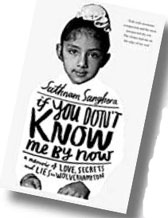Reviews
Books
Xinjiang treats

On her third visit to the Xinjiang Uygur autonomous region last summer, Lisa Carducci, a Canadian writer who has been living in Beijing for almost two decades, traveled extensively and interviewed more than 20 people representing varied aspects of Xinjiang, a place that is home to 55 of China's 56 ethnic groups, the exception being the Jino.
This month, the Foreign Languages Press has launched the English edition of her 276-page These Wonderful People of Xinjiang, printed on high quality paper and full of illustrations.
Readers will get to meet Yilari Chunguang, an ethnic Xibe bow-and-arrow maker, melon expert Wu Mingzhu, 6th generation Uygur embroider Ajiahan Sahmet, a "Russian Old Lady" Jina who brews kvas, Kazak gynecologist Jiang'er Rehati, Uygur Imam Abdurakip Damullah and Mongolian artist Lindai, among a host of other interesting characters.
Lisa introduces her "Kirkiz Family", and tells stories of how she was constantly mistaken for an Uygur.
The style is light and the tone familiar, making the reading a good choice even for non-native English speakers. Carducci's unique style of interviewing shines through. She has written 44 books in total, 26 after coming to China.
Carducci's singular vision of the Chinese reality leaves unforgettable impressions. Readers will be mentally transported to Xinjiang and those inspired to go and see things with their own eyes will be well prepared by this book, full of detailed information about the customs, religion, culture, music, education, daily life, work and art of the people there.
"Xinjiang is a region of extremes in China," Carducci writes. "The country's lowest depression, the warmest place, the most distant point from the ocean, and the region bordering the greatest number of countries. Xinjiang wonders are too numerous to be all mentioned but one must start somewhere, and These Wonderful People of Xinjiang puts the reader on the right way."
A French edition titled Ces gens merveilleux du Xinjiang, is also available. Xiao Liu
Compelling memoir

In If You Don't Know Me By Now: A Memoir of Love, Secrets and Lies in Wolverhampton, Sikh journalist Sathnam Sanghera prepares to tell his mother that he plans to marry outside the faith. But he's not the only one with secrets.
When a writer decides to use up what WH Auden described as "capital" - the stuff of life - in a memoir, it is a calculated sacrifice: a loss of privacy in favor of publication. Sanghera goes further still. His memoir does not depend on passive reminiscence. It is an absorbing, ongoing drama, played out on the page.
His education has taken him out of one world and into another. He went to Cambridge and became a journalist (on the Financial Times before moving to the Times). In many ways, he has left his family life in Wolverhampton behind. But as a writer, he is ambidextrous. He knows how to exist in two places at once. He brings London back to Wolverhampton and is able to use the distance between his two worlds to entertaining effect.
It is while he is trying to help reduce the weight of his mother's grossly overstuffed suitcase - she is preparing for a trip to India - that he finds a letter in which he discovers that his father and his sister have schizophrenia. He is 24 and his mother has protected him from the truth all his life.
At one point, he says: "We never look at our parents closely, do we, just as we don't see them as people." The book attempts to correct that. It contains the beautifully reconstituted story of his mother's arranged marriage and its painful aftermath. And he works hard at trying to understand his father and his sister and their suffering.
But it is the letter, all along, that we are waiting to have answered. It creates and sustains the suspense that has had you hooked throughout. The book could not be more enjoyable, engaging or moving.
The Guardian
(China Daily 04/03/2008 page20)














